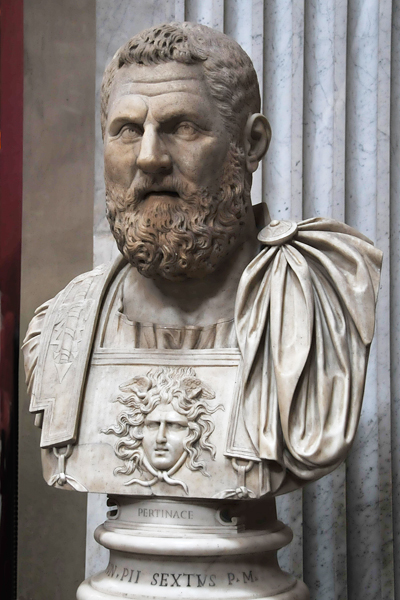
"So different was the opinion of everybody regarding Pertinax as contrasted with Commodus, that when people heard what had happened, they suspected that the story of his assassination had been put forth by Commodus to test them, and in consequence many of the governors in the provinces imprisoned the men who brought the news. It was not that they did not wish the report to be true, but that they were more afraid of appearing to have desired the death of Commodus than they were of failing to attach themselves to Pertinax. For of the latter no one, even if he committed an error so serious as this, was afraid, but of the former, every one, even if innocent of wrong-doing."
Cassius Dio, Roman History (LXXIV.2)
If the death of Pertinax was undeserved, certainly his funeral was elaborate, as witnessed by Dio--
"Upon establishing himself in power he erected a shrine to Pertinax, and commanded that his name should be mentioned at the close of all prayers and all oaths; he also ordered that a golden image of Pertinax should be carried into the Circus on a car drawn by elephants, and that three gilded thrones should be borne into the other amphitheatres in his honour. His funeral, in spite of the time that had elapsed since his death, was carried out as follows. In the Roman Forum a wooden platform was constructed hard by the marble rostra, upon which was set a shrine, without walls, but surrounded by columns, cunningly wrought of both ivory and gold. In it there was placed a bier of the same materials, surrounded by heads of both land and sea animals and adorned with coverlets of purple and gold. Upon this rested an effigy of Pertinax in wax, laid out in triumphal garb; and a comely youth was keeping the flies away from it with peacock feathers, as though it were really a person sleeping. While the body lay in state, Severus as well as we senators and our wives approached, wearing mourning; the women sat in the porticos, and we men under the open sky. After this there moved past, first, images of all the famous Romans of old, then choruses of boys and men, singing a dirge-like hymn to Pertinax; there followed all the subject nations, represented by bronze figures attired in native dress, and the guilds of the City itself—those of the lictors, the scribes, the heralds, and all the rest. Then came images of other men who had been distinguished for some exploit or invention or manner of life. Behind these were the cavalry and infantry in armour, the race-horses, and all the funeral offerings that the emperor and we senators and our wives, and the corporations of the City, had sent. Following them came an altar gilded all over and adorned with ivory and gems of India. When these had passed by, Severus mounted the rostra and read a eulogy of Pertinax. We shouted our approval many times in the course of his address, now praising and now lamenting Pertinax, but our shouts were loudest when he concluded. Finally, when the bier was about to be moved, we all lamented and wept together. It was brought down from the platform by the high priests and the magistrates, not only those who were actually in office at the time by also those who had been elected for the ensuing year; and they gave it to certain knights to carry. All the rest of us, now, marched ahead of the bier, some beating our breasts and others playing a dirge on the flute, but the emperor followed behind all the rest; and in this order we arrived at the Campus Martius. There a pyre had been built in the form of a tower having three stories and adorned with ivory and gold as well as a number of statues, while on its very summit was placed a gilded chariot that Pertinax had been wont to drive. Inside this pyre the funeral offerings were cast and the bier was placed in it, and then Severus and the relatives of Pertinax kissed the effigy. The emperor then ascended a tribunal, while we, the senate, except the magistrates, took our places on wooden stands in order to view the ceremonies both safely and conveniently. The magistrates and the equestrian order, arrayed in a manner befitting their station, and likewise the cavalry and the infantry, passed in and out around the pyre performing intricate evolutions, both those of peace and those of war. Then at last the consuls applied fire to the structure, and when this had been done, an eagle flew aloft from it. Thus was Pertinax made immortal."
Roman History (LXXV.4, 5.1-5)
There is also a biography of Pertinax in the Historia Augusta. The bust is in the Vatican Museums (Rome).